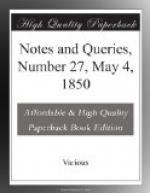Journal of Sir William Beeston.—In reply to the inquiry of “C.” (No. 25. p. 400), I can state that a journal of Sir William Beeston is now preserved in the British Museum (MS. Add. 12,424.), and was presented to the national collection in 1842, by Charles Edward Long, Esq. It is a folio volume, entirely autograph, and extends from Dec. 10, 1671, when Beeston was in command of the Assistance frigate in the West Indies, to July 21, 1673; then from July 6 to September 6, 1680, in a voyage from Port Royal to London; and from December 19, 1692, to March 9, 1692-3, in returning from Portsmouth to Jamaica; and, lastly, from April 25 to June 28, 1702, in coming home from Jamaica to England. By a note written by Mr. Long on the fly-leaf of the volume, it appears that Sir William Beeston was baptized in Dec. 2, 1636, at Titchfield, co. Hants, and was the second son of William Beeston, of Posbrooke, the same parish, by Elizabeth, daughter of Arthur Bromfield. (See Visit. C. 19. Coll. Arm.) His elder brother, Henry, was Master of Winchester, and Warden of New College; and his daughter and heir Jane married, first, Sir Thomas Modyford, Bart., and, secondly, Charles Long, to whom she was a second wife. To this may be added, that Sir William received the honour of knighthood at Kensington, October 30, 1692, and was Governor of Jamaica from 1693 till 1700. In the Add. MS. {445} 12,430. is contained a narrative, by Sir William Beeston, of the descent by the French on Jamaica, in June, 1694; as also the copy of a Journal kept by Col. William Beeston from his first coming to Jamaica, 1655-1680.
M.
Shrew (No. 24. p. 381.).—I know not whether it will at all help the inquiry of “W.R.F.” to remind him that the local Dorsetshire name of the shrew-mouse is “shocrop” or “shrocrop.” The latter is the word given in Mr. Barnes’s excellent Glossary, but I have just applied for its name to two labourers, and their pronunciation of it is clearly the former.
I should be glad to hear any conjecture as to the final syllable. The only folk-lore connected with it in this part of the country seems to be that long ago reported by Pennant and others, viz. “Cats will kill, but not eat it.”
C.W.B.
Trunck Breeches.—“X.Y.Z.” (No. 24. p. 384) will also find the following in Dryden’s Translation of Perseus:—
“There on the walls by Polynotu’s
hand,
The conquered Medians in trunk-breeches
stand.”
Certainly a very free translation. See the original, Sat. 3. Trunck is from the Latin truncus, cut short, maimed, imperfect. In the preface to Johnson’s Dictionary we have the following:—




